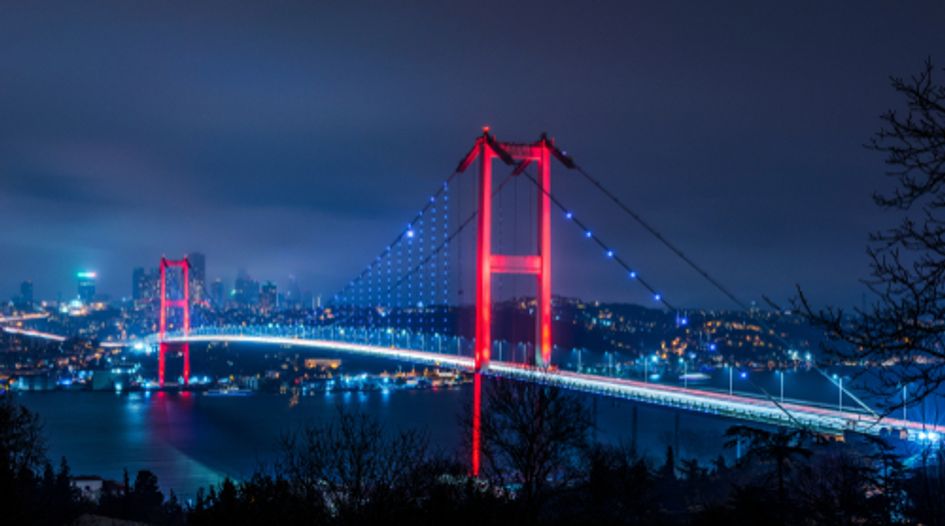Turkey: registration with Customs is a powerful option for brand owners

This is an Insight article, written by a selected partner as part of WTR's co-published content. Read more on Insight
Legal framework
Turkey is a party to several international conventions, including the Paris Convention, the Agreement on Trade-Related Aspects of Intellectual Property Rights and the Berne Convention. Turkey also has specific national legislation, including:
- the Industrial Property Code 6769 (the IP code);
- the Law on Turkish Intellectual and Artistic Works (5846) (the Copyright Act);
- the Code of Commerce;
- the Customs Law;
- the Anti-Smuggling Law; and
- Law 5651 on Regulating Broadcasting in the Internet and Fighting Against Crimes Committed through Internet Broadcasting (the Internet Law).
Border measures
It is possible to register IP rights (ie, trademarks, industrial designs, patents, utility models, copyrights, geographical indications, integrated circuit topographies and plant breeders’ rights) before Customs. It is advisable to follow this procedure as a crucial first step in combatting counterfeiting in Turkey.
The IP rights registration procedure before Customs is as follows:
- Rights holders can register their IP rights via an online central application filed before the Turkish Customs Ministry, which has effect over all Turkish borders and customs authorities.
- Customs monitors import, export and free trade zone transactions.
- Customs applications are registered within one to two months.
- No official fees are required for filing the applications.
If Customs finds any documents to be missing from the application, the rights holders or representatives will be requested to provide the missing documents within a reasonable time. If the missing documents are provided within the time provided, an official notification accepting the recordal of rights will be served to the applicant in approximately 20 to 30 days.
Customs provides one year of protection from the application date for recorded rights. The registration can be renewed periodically and will always provide a one-year period of protection. If the renewal term is missed, a new customs application may always be filed.
The following items are required for the records:
- documents evidencing that the applicant is the real rights holder (eg, the IP rights registration certificate);
- a power of attorney notarised and legalised (by apostille) if the application is filed via a legal representative; and
- a signatory circular evidencing the authorisation of the applicant if the application is filed in the name of a legal entity.
Although the following information is not mandatory to complete an application, it is crucial for the protection process:
- information regarding the genuine products and their distinguishing features;
- the countries where the genuine products are manufactured;
- the suspected differences between the genuine and infringing products and any other information on the infringing product;
- the itinerary of the genuine products;
- the Harmonised System Codes (HSCs) of the genuine products (HSCs are international codes defining the products for international trade); and
- the details of the local legitimate dealer, importer or licensees.
If the suspicious goods carry a mark that has been registered before Customs and the right holder is notified of this, the right holder will have 10 working days to examine the goods and commence legal procedures. If a sound reason is provided, it is possible to request a 10-working-day time extension from Customs, which will be provided at Customs’ discretion.
Customs can act ex officio and notify the trademark attorneys or trademark owners of suspicious third-party activities, even if the trademark is not registered with it. In those cases, the rights holders have three working days to complete all procedures (ie, examine the products and take action or register their trademark rights before Customs to receive an additional seven working days of seizure).
In the case of trademark counterfeiting, criminal procedures can be followed, and a complaint can be filed before the public prosecutor to commence criminal proceedings. It is also possible to request a preliminary injunction from the civil IP courts for civil proceedings; otherwise, Customs will release the suspected goods once the seizure period ends.
In the case of patent or design counterfeiting, only the civil routes can be pursued.
If both parties agree, it is possible to request the destruction of the seized goods from customs officers by filing a petition between three and 10 working days after the seizure of the goods. The destruction procedure can be applied without a court order.
The international exhaustion principle under Article 152 of the IP Code permits the parallel importation of genuine products. Actions related to products that are subject to IPR protection fall outside the scope of the right once the products are released to the market by the right holder or third parties with the right holder’s consent; therefore, international exhaustion of rights is accepted.
However, the second paragraph of Article 152 indicates that the trademark holder has the right to prevent the commercial use of the products, within the scope of the provisions of the first paragraph, by means of being modified or downgraded by third parties. These activities can be deemed to fall within the scope of trademark infringement and unfair competition, especially owing to the fact that the function of the trademark to identify or guarantee the source or origin is damaged.
Criminal prosecution
Criminal provisions are regulated for registered trademark rights and copyright protection, whereas design and patent infringement is not regulated as a criminal offence.
The procedure for filing a criminal complaint is as follows:
- The criminal route is generally used for counterfeit products where the trademarks are identical, and there is no room to evaluate similarity and confusion.
- Trademark infringement is an offence prosecuted based on a complaint. Rights holders must file a criminal complaint before the relevant public prosecutor.
Only a criminal judge can issue search and seizure warrants. According to those warrants, seizure operations are conducted by the provincial security or the police directorate IP department.
To prevent the loss of evidence, or if the counterfeiting products are harmful to human health, seizure operations can be conducted ex officio by the police upon the order of the public prosecutor. In those cases, rights holders must file a complaint before the relevant public prosecutor to continue the seizure and commence criminal proceedings. There are specialised criminal IP courts available in Istanbul, Izmir, Ankara and Antalya.
Criminal provisions are regulated by the IP Code. According to Article 30 of the code, a penalty of:
- between one and three years’ imprisonment and a judicial fine calculated per day for up to 20,000 days will be handed to person who, while infringing a trademark right through adaptation or likelihood of confusion, produces or provides services, puts on the market or sells, imports, exports, buys for commercial purposes, possesses, transports or stores goods;
- between one and three years’ imprisonment or a judicial fine calculated per day for up to 5,000 days will be handed to a person who removes the sign indicating trademark protection from a product or its packaging without authorisation; and
- between two and four years’ imprisonment and a judicial fine calculated per day for up to 5,000 days will be handed a person who, without authorisation, disposes of a trademark right, which is owned by someone else, by transferring, licensing or pledging it.
Additional specific security measures will be taken if a legal entity commits a crime outlined in Article 30.
If the counterfeiter reveals the source of the counterfeit products and assists in the identification of the producer and the seizure of the counterfeits, they will not be sentenced; however, in practice, it is almost impossible to apply this procedure owing to lack of cooperation.
If the accused has no criminal record, the court may decide to defer the announcement of the verdict. In that case, the accused should give their consent, otherwise the clause regarding the deferment of the announcement of the verdict will not be applied. Where the accused intentionally commits any crime within the five-year period after the date of the finalisation of the decision, the court will pronounce the judgment.
If the court is convinced of the counterfeit nature of the seized products, the products will be destroyed at the end of the criminal procedure. The IP Code regulates a fast-destruction procedure.
Pursuant to Article 163, if the seized goods cannot be preserved at the custodial office owing to quantity, size or character, in line with the public prosecutor’s instructions, sufficient samples will be taken from the goods, and the remaining goods will be sent to a financial organisation in the locality.
If there is a risk that the infringing goods will be damaged or lose value, or their preservation will be a significant burden, following the examination, based on the public prosecutor’s request at the investigation phase, the court may decide to destroy the goods before the final decision.
Civil enforcement
Rights holders may follow a civil route to cease and prevent infringing acts and seek damages.
The key points of civil enforcement include the following:
- Rights holders may apply to specialised IP courts, which are available in Istanbul, Izmir, Ankara and Antalya. In places where there is no specialised IP court, the first-instance civil court will undertake the legal proceedings and procedures that are within its scope. If there are more than two first-instance civil courts, the third first-instance civil court will be the competent court.
- Turkey has a three-degree system (ie, the first-instance court, the appellate court and the Supreme Court), which is accepted until a case is finalised.
- The first-instance court’s initial decision in a straightforward dispute is received within approximately 15 months, and the processes before the appellate court and the Supreme Court takes approximately 18 months per appeal.
Rights holders may take the following route in a civil enforcement:
- preliminary injunction request;
- evidential action; and
- main civil action.
In the absence of any registered rights, it is possible to put forward claims of unfair competition.
Preliminary measures
Persons who have the right to institute legal proceedings under the IP Code – on condition that they prove that the action forming the subject of the proceedings violates their IP rights in Turkey, or serious and effective preparations are performed to that end – may ask the court to order a preliminary injunction to ensure the effectiveness of the judgment to be delivered. The court usually requests a guarantee deposit to prevent possible losses of the adverse parties.
Preliminary injunctions can:
- prevent and stop actions (eg, purchasing, selling, displaying at fairs, importing and exporting) that constitute infringement of the plaintiff’s IPR;
- seize and store anywhere in Turkey (including Customs and free ports or zones) products infringing IP rights, imported products and instruments used exclusively in the production of infringing goods;
- block access to the infringing content from internet; and
- submit a security in terms of compensation for any damage.
A right holder may apply for a preliminary injunction by making a request without notification to the adverse party. This can be granted on an ex parte basis, generally by ordering prior expert examination. Pursuant to the Civil Procedure Law, if the applicant’s right requires immediate protection or notifying the adverse party would cause serious and irrecoverable damage, the judge may grant the preliminary injunction without hearing the adverse party’s arguments.
In those cases, the adverse party is entitled to file an objection within one week of being notified of the preliminary injunction. If the court rejects the removal of the preliminary injunction, the adverse party may appeal the interim decision. The preliminary injunction will be valid until the case has been finalised unless the court renders an interim decision to the contrary or the appellate court decides to remove the preliminary injunction.
To implement a preliminary injunction, a right holder should apply to the relevant execution office within one week of notification of the preliminary injunction decision; otherwise, it will ex officio be deemed invalid.
Preliminary injunctions can be requested within an evidential or civil action or solely as an immediate precaution. In case a preliminary injunction is obtained without filing a main civil action, the right holder must file a civil action within two weeks of the date of the execution request and notify the relevant execution office.
Remedies include:
- determination and cease of infringement;
- preliminary injunction;
- compensation;
- permanent injunction;
- seizure and destruction of the infringing products and tools (eg, devices and machines) used exclusively for the production of the products; and
- publication of the summary verdict of the court decision.
If the right holder files an evidential action, the court may decide to order a determination of evidence at the premises of the adverse party without notifying the adverse party to avoid the destruction of evidence. In such case, the infringing goods will be determined with the official expert present, and the evidence will be properly stored and secured.
Civil action for damages can be based on an existing IPR application after its publication in the bulletin for opposition purposes.
Material damages include actual loss and loss of revenue. Loss of revenue should be calculated using three evaluation methods, depending on the choice of the right holder:
- the potential revenue gained by the right holder had the competition brought about by the infringer not existed;
- the net revenue obtained by the infringer; and
- the payment of the licence fee by the person who infringed the IPR, if that person used the rights through a licence agreement in accordance with the law.
The right holder can choose any of the above methods, and the court may decide to add an equitable share to the calculation of revenue)
In calculating non-realised income, factors such as the economic value of the IPR or the number, term and type of licence related to the IPR at the time of infringement, as well as the nature and extent of infringement, is considered. The court can decide on a fair share to be added in the calculation of the income if it concludes that the IPR is the determining factor in the generation of demand for the product.
Compensation of reputational damage can be requested within the scope of a civil action.
Mandatory mediation for compensation claims
The mediation process as an initial procedure is a mandatory course of action for civil proceedings where compensation is claimed. Three options are available:
- parties may mutually agree on a mediator from the official list;
- if one party applies to a mediator, the adverse party may approve it; and
- parties may apply to the mediation office located at the address of the competent court, and the mediation centre will appoint the mediator.
The mediator must resolve the dispute within a six weeks, which can be extended for a further two weeks. At the end of this process, if the parties cannot reach an agreement, the mediator will submit his or her final report, and the court will hold the dispute.
Anti-counterfeiting online
Unauthorised internet commerce
According to the E-Commerce Law and the Electronic Commerce Regulation, intermediary service providers are not liable for monitoring the lawfulness of the content provided by third parties in line with their services; however, they must remove the unlawful content after being notified of the infringement, otherwise they will be jointly liable.
Internet security
Online complaints before social media: In determining the existence of counterfeit products sold via social media accounts, or where the adverse party is using trademarks or designs in account or domain names without authorisation, an online complaint can be filed with the social media accounts on the basis of IPR infringement and a request can be made to remove the infringing content or close the account.
Online notary determination: This procedure can be applied as an initial step to secure evidence and is considered as official evidence before the courts. According to the Notary Public Law, it is possible to determine infringing content through the website of the Notaries Union of Turkey.
Cease and desist letters: Cease and desist letters can be served via a public notary to online infringers, requesting the cessation of infringing acts (eg, infringing use of logos), the removal of the relevant content from their websites and marketplaces, the destruction or removal of the conflicting IPR from their web pages and the undertaking in writing never to use or register the right.
Online investigation strategies
Some private investigation companies provide services on internet monitoring. They provide detailed investigation reports and, on request, purchase sample products as evidence for further legal proceedings.
ISP liability
There is no clear regulation regarding the liability of internet service providers (ISPs) with respect to trademark infringement takedowns. In practice, ISPs are not responsible for controlling the content or searching for the presence of unlawful practices; however, the ‘notify and remove’ principle is accepted under Turkish law. ISPs must remove unlawful content from publication after being notified or informed of the infringement; otherwise, they will be jointly liable.
Article 4 of the Copyright Act regulates the takedown process of online copyright infringement, such as reproduction, making the work available to the public, alteration, distribution and communication to the public by devices enabling the transmission of signs, sound and images without the authorisation or consent of the copyright owner.
Copyright owners may contact the content provider for the removal of the infringing content within three days. If the content provider does not respond to the request within that period, the copyright owner may submit a request to the competent public prosecutor to grant an order against the ISP to block the content provider’s internet access.
Preventive measures and strategies
Use of local counsel and investigators
Although there is no regulation regarding private investigation under Turkish legislation, rights holders may collaborate with independent consulting and investigation companies. These companies provide services on internet monitoring, in-depth investigations, market checks determining the list of targeted stores selling counterfeit products and purchasing of sample products as evidence.
Licensing to third parties
The rights holders must have effective and timely control over contractual parties and cooperate with parties to keep a close eye on the market to fight existing and possible counterfeits. According to Article 29 of the IP Code, the unauthorised extension of the licence right is deemed to be trademark infringement. The licensee can access a special authentication method for auditing the products.
Cooperation with national anti-counterfeiting agencies
The Security Directorate, the IP police department, conducts raid operations periodically. Where counterfeit products are harmful to human health, it works in cooperation with the Ministry of Health to conduct ex officio operations upon the order of the public prosecutor.
The Ministry of Trade, the Directorate General of Customs, offers training to build awareness between customs officers.
Products seized owing to the Anti-Smuggling Law will be confiscated before the Customs Liquidation Directorate. The liquidation of the products is done via sale or auction. The smuggled products are mostly counterfeit.
If the right holder or its representative records its rights before the Customs General Directorate of Liquidation, before the liquidation process begins, the directorate will inform ex officio the right holder of the smuggled products that have been seized with respect to smuggling to allow the right holders to submit a complaint or obtain a preliminary injunction decision within 10 working days to prevent the sale of those goods.
During trade fairs, infringing activities can be determined through the notary public or an expert appointed by the court. For an official expert examination, an evidential action should be filed before the specialised IP courts.







